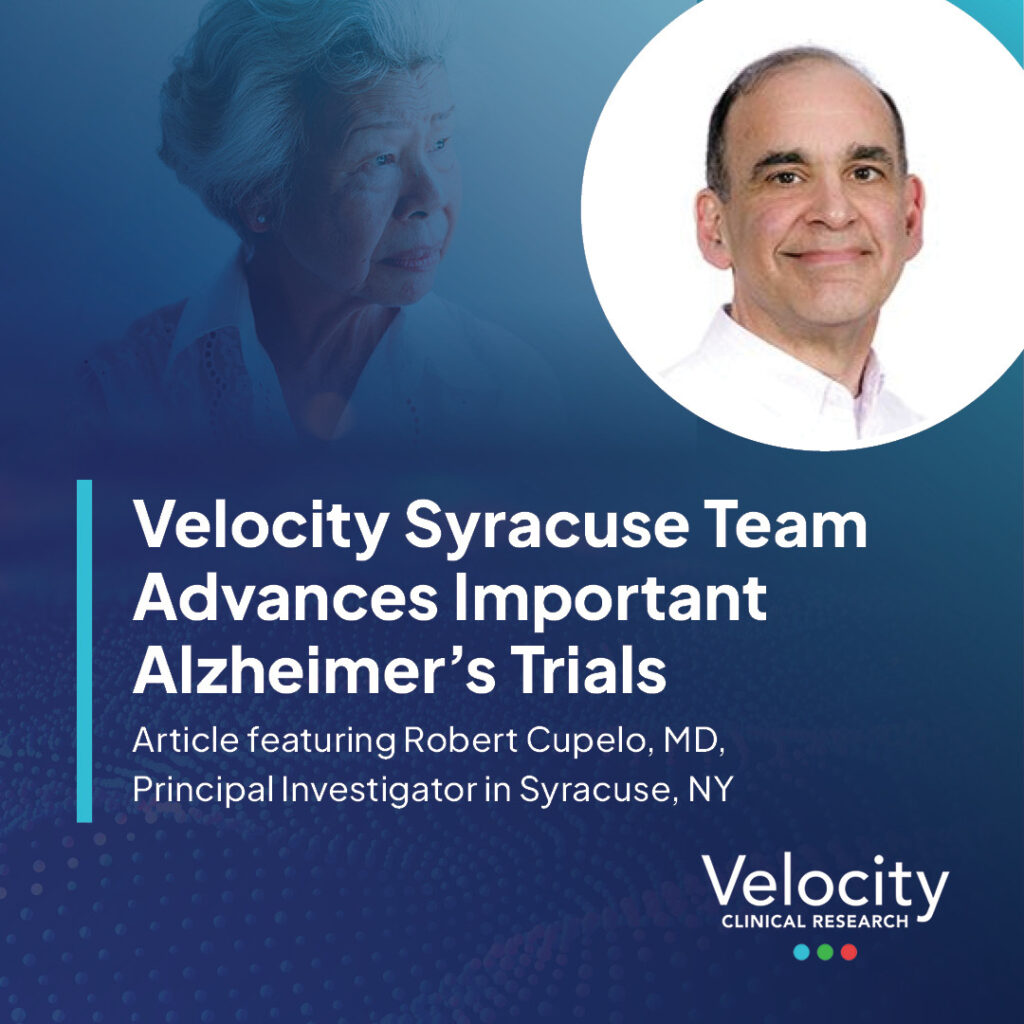Alzheimer’s is currently ranked as the seventh leading cause of death in the United States and is the most common cause of dementia among older adults.
Alzheimer’s disease, a cruel and pernicious affliction, is a brain disorder that slowly destroys memory, thinking skills, and eventually, the ability to carry out even the most simple and basic life tasks.
Dementia, the loss of cognitive functioning — thinking, remembering, and reasoning — and behavioral abilities, ranges in severity from the mildest stage, when it is just beginning to affect a person’s functioning, to the most severe stage, when the person must depend completely on others for help with basic activities of daily living. It also takes a toll on loved ones, friends, and others in the patient’s circle.
It has eluded easy cures and fixes, but Robert Cupelo, MD and the dedicated team at Velocity Clinical Research in Syracuse, NY refuse to surrender. “A cure isn’t around the corner, but it’s coming and that should give everyone a sense of hope,” he says. In the meantime, there are several ongoing clinical trials and other research that help identify the disease early on to minimize symptoms and potentially accelerate finding a cure.
And while September 21 is World Alzheimer’s Day, Dr. Cupelo doesn’t need a calendar to remind him of the importance of clinical trials and other efforts to battle the disease.
Dr. Cupelo has been active as a Principal Investigator (PI) in Alzheimer’s clinical trials since 2017 after several decades as an internist and practicing physician. He’s worked on nearly a dozen trials, including one that resulted in a 2019 FDA approval for a PET scan tracer marker to help identify Alzheimer’s early in the affliction’s cycle before it has begun to impact patients more significantly.
It’s vital to catch Alzheimer’s as early as possible, Dr. Cupelo notes, because, while there are no current treatments to cure it, there are treatments that can help slow the damage it inflicts on a person’s life and the stress it puts on those around them. “We can delay the progression, that’s why it’s so important to identify it as early as possible,” Dr. Cupelo adds.
“It’s horrible to give a patient an Alzheimer’s diagnosis, and it’s also difficult for the practitioner because [at the moment] we can’t treat it, especially if the case has progressed,” he explains.
That’s part of what fuels his dedication to working on Alzheimer’s clinical trials.
Symptoms tend to appear later in life. It is difficult to estimate how many Americans suffer from a form of it because the only absolute way to confirm a case is a brain biopsy after a person has died. However, experts suggest that more than 6 million Americans, most of them age 65 or older, may have Alzheimer’s, according to the National Institute of Health (NIH).
Dr. Cupelo also sings the praises of his colleagues in Syracuse. “I wouldn’t want to work here if it weren’t such a great place to work,” he says, noting the staff shares his commitment to finding cures and treatments to help eradicate a horrible disease and thereby improve millions of lives.
“We hope we can end up contributing, even in a small way, to finding a cure someday,” Dr. Cupelo says.
Velocity conducts memory-loss studies at several locations across the U.S. If you would like to take part in an Alzheimer’s study with Velocity Clinical Research, please visit our Alzheimer’s research page. To learn more about our current clinical trials, visit VelocityClinicalTrials.com.

